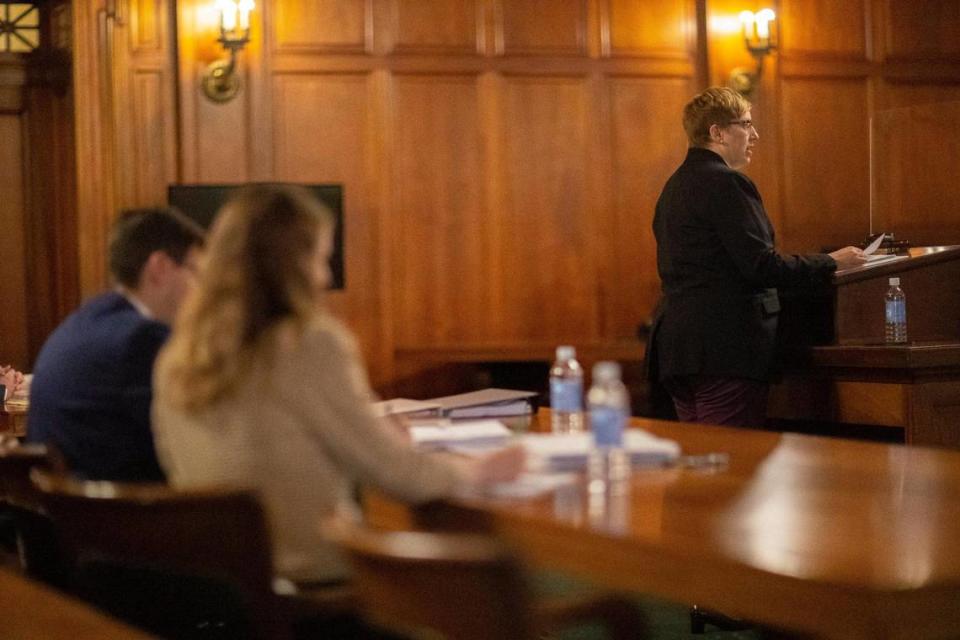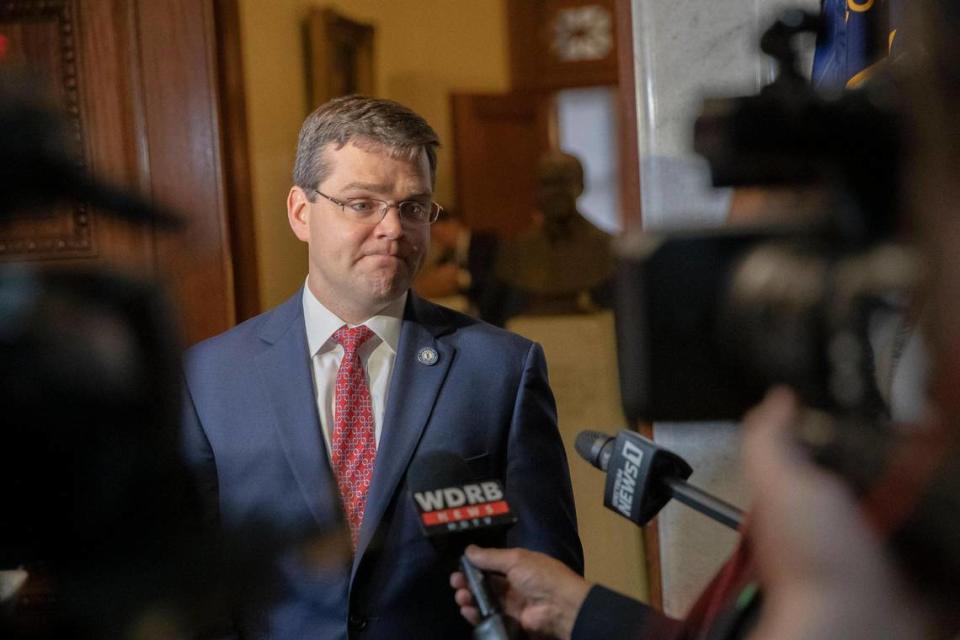KY Supreme Court hears arguments on limiting the governor’s power during emergencies
- Oops!Something went wrong.Please try again later.
- Oops!Something went wrong.Please try again later.
A day before Gov. Andy Beshear is to remove most COVID-19 restrictions in Kentucky, the state Supreme Court on Thursday heard arguments on Beshear’s challenge of Republican-backed laws that limit his authority to respond to the coronavirus pandemic and other emergencies.
Chief Justice John D. Minton Jr. said after nearly two hours of oral arguments on two related cases that the state’s highest court will rule “as quickly as we can.” A decision is not expected for several weeks.
The state Supreme Court last year unanimously ruled that Beshear’s orders were legal but that was before the legislature passed laws earlier this year restricting the governor’s powers.
At issue Thursday were cases from Scott and Franklin circuit courts.
The Scott case involves Beshear’s appeal of Circuit Judge Brian Privett’s ruling to temporarily block the state from enforcing some of Beshear’s executive orders restricting crowd capacity and operating hours at several restaurants and breweries.
The Franklin case involves Attorney General Daniel Cameron’s appeal of Circuit Judge Phillip Shepherd’s decision to temporarily block four legislative measures the General Assembly enacted this year that curb Beshear’s emergency powers.
The seven-member Supreme Court heard arguments first on the Scott case.
Judge Privett’s preliminary injunction came in a lawsuit brought by Goodwood Brewing Company, doing business as Louisville Taproom; Frankfort Brewpub and Lexington Brewpub; Trindy’s in Georgetown; and Kelmaro, doing business as The Dundee Tavern, in Louisville.
Privett said his order meant Beshear could not issue or enforce new restrictions against those specific businesses.
Beshear’s general counsel, Amy Cubbage, told the Supreme Court Thursday that Beshear’s position has been clear since the start of the coronavirus pandemic in March 2020. He will “take all action consistent with the law necessary to protect public health,” she said.

The high court should find that the Scott Circuit Court abused its discretion in trying to stop the governor’s emergency declaration, she said.
Cubbage contended that the Scott court did not hear enough proof to issue the injunction. Its order, she said, “invited a public health catastrophe and pure chaos from a public health and legal perspective.”
Oliver Dunford, an attorney representing the businesses, said Beshear violated Kentucky law by continuing to enforce executive orders which had expired.
He said new laws approved this year by the Republican-led state legislature redefined the Democratic governor’s powers. He was referring to Senate Bill 1, which limits Beshear’s ability to issue orders during a state of emergency to 30 days unless extended by the General Assembly; House Bill 1, which allows businesses, schools, nonprofits and churches to stay open if they meet COVID-19 guidelines set by either the federal Centers for Disease Control and Prevention or Kentucky’s executive branch, whichever is least restrictive; and Senate Bill 2, a companion bill to SB 1 to give the legislature more power over administrative regulations issued during an emergency.
Dunford noted that Cubbage had said Beshear plans to keep in place Friday the state of emergency he instituted in March 2020, even as he lifts most restrictions. He said he did not know what new regulations Beshear might issue Friday.
Several justices peppered the attorneys with questions.
Justice Laurance B. VanMeter and Chief Justice Minton asked about the statewide implications of a circuit courts’ issuance of injunctions. Justice Lisabeth Hughes asked why the Scott case will not be moot with Beshear’s lifting of restrictions Friday.
Cubbage said much of the case would be moot but the Beshear Administration still would want the injunction dissolved because its statewide emergency declaration will remain in place in order to receive federal funding and continue the effort to vaccinate Kentuckians.
Justice Michelle Keller inquired about how Scott Circuit Court handled the businesses’ request for the injunction “within a matter of minutes in a crowded motion document and not have a separate hearing on it.”
Dunford said the Scott court had “all the evidence it needed to make this determination. The irreparable harm here was the governor’s failure to follow the law.”
In the Franklin case, Judge Phillip Shepherd temporarily blocked House Joint Resolution 77, keeping Beshear’s COVID-19 restrictions in effect, including the mask mandate. The resolution specifies which of Beshear’s COVID-19 orders would remain in place if the legislature wins its legal fight against him. Shepherd had temporarily blocked three other laws earlier this year curbing Beshear’s powers.
Attorney General Daniel Cameron defended the legislation.
State Solictor General Chad Meredith, representing Cameron, told the Supreme Court Thursday that it should vacate Shepherd’s temporary injunction because the court lacked judicial authority to act on the matter.
“The Franklin Circuit Court had no jurisdiction to take any action at all in the first place,” said Meredith. He argued that courts can only adjudicate actual cases or controversies between parties.

“Here we have no such dispute,” said Meredith. “All we have is a merely academic dispute, a difference of opinion over the validity of these statutes and that is not justiciable.”
Justice Hughes asked about a governor’s power to suspend statutes and Justice Keller asked about a governor’s loss of power.
Cubbage argued the lower court did have the authority to issue an injunction and told the high court that Beshear filed for the injunction in February, when COVID-19 cases and deaths were at an all-time high.
“The governor had to take action,” she said, adding that the administration’s response has eased the pandemic in Kentucky. The virus has been tied to the deaths of more than 7,120 Kentuckians.
She also expressed concern about new legislation in SB 1 that places the governor’s authority to suspend statutes under the attorney general.
After the court hearing, Beshear told reporters that a governor’s emergency powers certainly “have to be large enough with a one-in-every-hundred year pandemic that creates the deadliest year in our history, it has to be significant and strong enough to do what’s necessary there.”
“You look back at different things that this legislature has tried to do in the midst of this pandemic and they would have not had the courage to step up and mandate masks, which we know from the experts is absolutely necessary,” he said. “We would have looked like the Dakotas and not what we looked like here in Kentucky.”
Attorney General Cameron said, “We argued before the Supreme Court today that the governor did not have an injury or controversy necessary to bring a lawsuit, and he challenged the laws simply because he did not like them. The General Assembly is a separate, co-equal branch of government and legislators must be able to make changes to state law and alter the Governor’s authority without the threat of lawsuits that have no cause or validity.”
(Herald-Leader staff writer Daniel Desrochers contributed to this article.)

